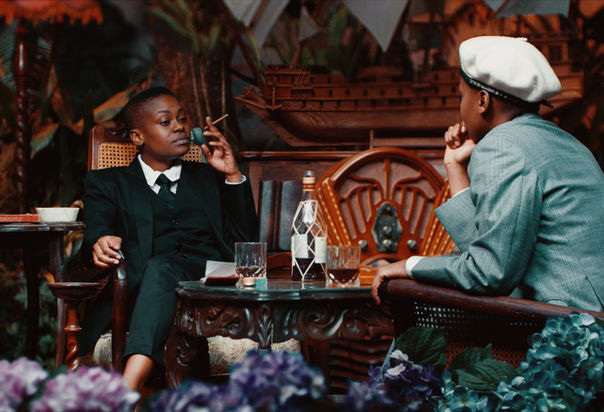How to Stage Colonialism
By Iván Zgaib

© Kudzanai Chiurai
A black woman stares straight into the camera. “I’ve been whitewashed,” she says dramatically. So WE LIVE IN SILENCE: CHAPTERS 1-7 (Berlinale Forum Expanded) opens, and artist and filmmaker Kudzanai Chiurai formulates a critical response to Med Hondo’s 1967 film SOLEIL O. By playing with ironies and contradictions, a theatrical approach to form and acting shapes a precise political perspective. It only takes 36 minutes for Chiurai to make a tenacious statement: colonialism is still present today. Thus, colonial hypocrisy is turned upside down by a series of tableaus: black people are suddenly repeating their colonizer’s actions and discourses. A woman of color even defends African slavery as if she herself had become a slaver.
But the film’s biggest achievement lies in its capacity to avoid a didactic exposition through dialogue. Quite the opposite, Chiurai’s political point of view takes the shape of pictorial framing. This is especially evident in the long durational still shots, where the image resembles a painting inhabited by moving bodies. This manifestation of the artifice also appears within the characters; their elegant poses, their theatrical speeches and their gazes directed toward the camera reveal a fictionalised universe in creation. The jungle setting is full of plastic vegetation, suggesting that the colonial mindset is not natural, but staged and artificial.
From time to time, WE LIVE IN SILENCE: CHAPTERS 1-7 changes its fixed camera for delicate movements that reframe the visual perspective. It is through this exploration of space that Chiurai contrasts different visions that often seem contradictory. Take the final scene where a group of black women in colonial dress are seated around a large table. As the camera dollies out, the space widens to reveal a modern-day white cop chasing a group of black people dressed in jeans and t-shirts. This camera work allows for the mise-en-scène to play out like a game of confused temporalities. Has colonialism really ended? Chiurai’s contemporary treatment of the historical imaginary erases a clear distinction between past, present and future. By the end, the film rediscovers cinematic language as a device to raise new questions about the imposition of a colonized perspective.

